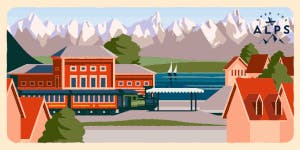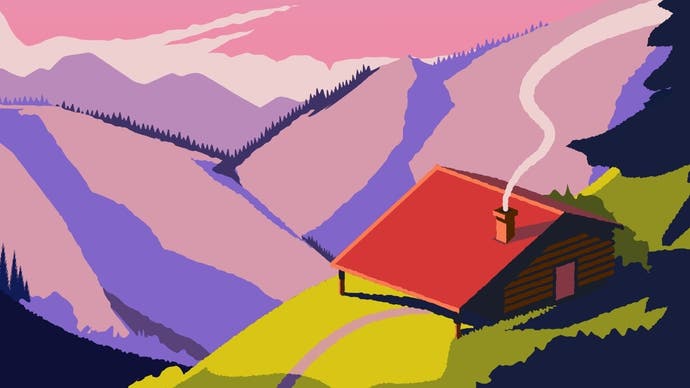Over the Alps review - a joyous wartime romp across the mountains
Philately will get you nowhere.
Some games have you from the start screen. So it is with Over the Alps, a narrative adventure from a team that's had experience at both Inkle and Failbetter, so knows quite a bit about this narrative adventure stuff by now. Anyway, the start screen: a stylised plane coasts over a stylised mountain range. At the bottom of the image, the legend: Alpine Adventure. Alpine Adventure! Yes please!
That image puts me in mind of the luggage labels that people like George Bailey used to fantasize about sticking on their creaky brown suitcases as they battered their way around the world on a limited budget. Such romance in those images, where the world is abstracted into shards of pastel colours, the countryside always politely bisected by railway tracks and the seas always busy with those planes that can land on the water. Over the Alps borrows the visual style of luggage labels and travel posters as it leads you across the mountainous parts of Europe on the eve of World War 2, but its biggest hook lies with something that feels related but separate.

Stamps! The idea here is that you're a secret agent dropped into elbowy intrigue on the continent as Hitler moves his pieces into position. Because this is a narrative adventure, the manner of the storytelling is as important as the story's being told, and this particular tale unfolds in text on the postcards the agent sends home to his old chum Aubrey. Aubrey! What a perfect name for a pal back in Blighty. There is no way that Aubrey doesn't drink a bit too much and eat a bit too much while lingering over luncheon at the club. I can't necessarily see Aubrey's face, but I can see the sag of his watch chain over his slight paunch, and I can sense the way his cheeks and nose go a bit ruddy when he's had one too many. He is the perfect person for a spy to be writing to, telling a story of crosses and double-crosses, lucky escapes and unhappy accidents. Aubrey understands! Aubrey sends his best! Aubrey will buy everyone a round when the whole thing blows over.
Those stamps, though. As the story unfolds you get to decide how to goose things in one direction or another by using stamps. Each stamp has an icon on it that encourages you to think of the kind of attitude it represents. Someone asks a favour: do you want to be debonair? Do you want to be professional? Do you want to be ruthless? Choose between the top hat, the glasses or the axe, then, mate. You swipe between each stamp to see what it's going to do to the story, and then you commit - brilliant, this bit - and the stamp is peeled off and the story continues. Swipe. Splat! Off we go.

I was quite a long way into the game and still pondering over the precise meanings of those stamps and their icons. The choices seem to flare them a little until they have the sort of roominess of interpretation you get in Tarot cards. Beyond these microdecisions the story leads you from one Alpine spot to the next, allowing you to choose routes now and then by selecting which curving trail you'd like. Meanwhile your agent steals cars or hops trains, settles down in a nice restaurant or meets mysterious ladies in remote cabins. Always the Swiss police are on your tail - aren't they always? - and this adds a sense of additional urgency as the plot starts to take shape around you.
These narrative games, I tend to think of them as one genre, but that's of course enormously stupid of me and Over the Alps proves it. 80 Days was all about a blend of the big choices and the small: where do you want to go next, but also how much kindness do you want to show this waiter right now? Something like Sunless Sea is all about managing failure, I think: exploring the continuum between your curiosity and your anxiety. Over the Alps reminds me a bit of skiing, which I've only just remembered now is such a brilliant word to type, with those zany double Is right in the middle. Anyway, skiing: you're zipping along, always headed in the right direction, but you get to choose how to arc left and right now and then, which route through the next bunch of trees to take, which incline to use as you round a corner. The destination is never in doubt, but the way you get there - the style, the attitude, the poise - is the important part. What a lovely, bracing game this is.


